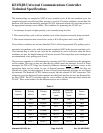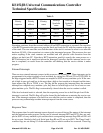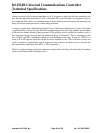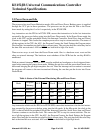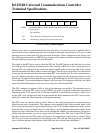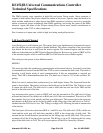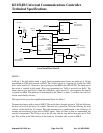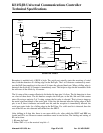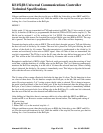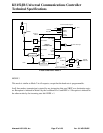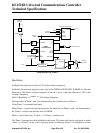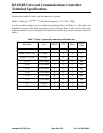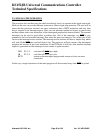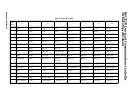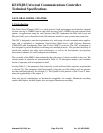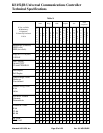
KS152JB Universal Communications Controller
Technical Specifications
Kawasaki LSI USA, Inc. Page 26 of 120 Ver. 0.9 KS152JB2
If these conditions are met, then the stop bit goes to RB8, the 8 data bits go into SBUF and RI is
set. Else the received frame may be lost. After the middle of the stop bit, the receiver goes back to
looking for a 1-to-0 transition on the RxD pin.
MODE 2
In this mode, 11 bits are transmitted on TXD and received on RXD. The 11 bits consist of a start
bit (0), 8 data bits (LSB first), a programmable 9th data bit (TB8 in SCON) and a stop bit (1). The
9th bit can be assigned 1 or 0 by writing to bit 3 of SCON. On transmission, this bit will be
inserted into the data stream. On reception the received 9th bit goes into RB8 in SCON. The stop
bit is ignored. The baud rate is programmable to 1/32 or 1/64 of the oscillator frequency.
Transmission begins with a write to SBUF. The serial data is brought out on to TxD pin following
the first roll-over of divide by 16 counter. The next bit is placed on TxD pin following the next
rollover of the divide by 16 counter. Thus the transmission is synchronized to the divide by 16
counter and not directly to the write to SBUF signal. After all 8 bits of data are transmitted, the
stop bit is transmitted. The TI flag is set in the S1 state after the stop bit has been put out on TxD
pin. This will be at the 11th rollover of the divide by 16 counter after a write to SBUF.
Reception is enabled only if REN is high. The local serial port actually starts the receiving of local
serial data, with the detection of a falling edge on the RxD pin. The 1-to-0 detector continuously
monitors the RxD line sampling it at the rate of 16 times the selected baud rate. When a falling
edge is detected, the divide by 16 counter is immediately reset. This helps to align the bit bound-
aries with the rollovers of the divide by 16 counter.
The 16 states of the counter effectively divide the bit time into 16 slices. The bit detection is done
on a best of three basis. The bit detector samples the RxD pin, at the 8th, 9th and 10th counter
states. By using a majority 2 of 3 voting system, the bit value is selected. This is done to improve
the noise rejection feature of the local serial port. If the first bit detected after the falling edge of
RxD pin, is not 0, then it indicates an invalid start bit, and the reception is immediately aborted.
the local serial port again looks for a falling edge in the RxD line. If a valid start bit is detected,
then the rest of the bits are also detected and shifted into the SBUF.
After shifting in 8 data bits, there is one more shift to do, after which the SBUF and RB8 are
loaded and RI is set. However certain conditions must be met before, The loading and setting of
RI can be done.
1. RI must be 0 and
2. Either SM2 = 0, or the received stop bit = 1.
If these conditions are met, then the stop bit goes to RB8, the 8 data bits go into SBUF and RI is
set. Else the received frame may be lost. After the middle of the stop bit, the receiver goes back to
looking for a 1-to-0 transition on the RxD pin.



